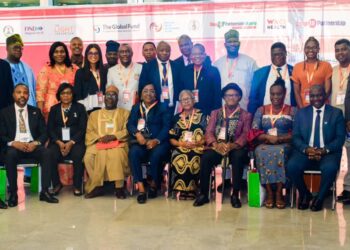Inadequate and unequal distribution of human resources for health is a major challenge in the Niger State’s health sector, the governor of the state, Abubakar Bello, has said.
The governor said this on Tuesday while receiving some senior executives of the National Institute for Policy and Strategic Studies, (NIPSS) study tour team course 41, who paid him a courtesy visit at the government house in Minna, the state capital.
We reported that the NIPSS delegation arrived at the state on Monday for a study tour of the health sector, especially the primary health system.

The visit is coordinated by NIPPS, in collaboration with the Development Research and Project Centre (DRPC).
Mr Bello said health workers at the state’s General Hospital are overworked and overwhelmed by patients who throng the facility from far-to-reach hinterlands because of the dearth of human resources in the Primary Health Centres.
“Last year, I visited the general hospital and the doctor there was overwhelmed. I arrived at about 10 p.m. and found that he has been working since 4 p.m. and even at that time; he still had about 40 patients to attend to. I looked into his eyes and I can (could) clearly tell that this man is tired,” the governor said.
“I was disturbed and we employed about 300 doctors afterwards. If people are healthy, their productivity increases especially it has to do with human lives.”
Mr Bello said there is a huge shortage of health professionals in the rural areas of the state at the moment. He lamented that the state is “losing a lot of people during deliveries. The numbers are not encouraging.”
“It is the responsibility of the government to do whatever it can to change the narrative and we are doing our best.”
‘PHC Under One Roof’
The governor said it “occurred to me that most of the patients I see there (at the general hospital) can be treated at the PHCs; so we adopted the ‘PHC under one roof’. It initially should be the responsibility of the local government area (LGA) authority but we realised that capacity is not there so we brought it to state level and brought PHC under one roof.
“For a start we decided to revitalise one PHC in each of the 274 wards in the state to at least minimise sick people travelling from various wards to urban towns for care. Once their needs are addressed at the ward level, then no need to worry the secondary level.”
We reported that the “PHC under One Roof” is modeled on guidelines developed by the World Health Organisation (WHO) for integrated district-based service delivery and on majorly, the principle of integration of all PHC services delivered under one authority, at a minimum.
It consists of health education and promotion, maternal and child health, family planning, immunisation, disease control, essential drugs, nutrition and treatment of common ailments.
‘Brain Drain’
Meanwhile, the state commissioner of health, Mustapha Jibril, spoke on the challenge of brain drain in the rural and far-flung areas of the state.
He explained the government’s plan on tackling the challenge.
“On human resources we are trying to come with various policies that will enable us to send people to rural areas and make them stay there,” he said. “Health workers we are recruiting for those places have to sign an agreement that they will not leave or request for transfer over a period of time or they will be relieved of the jobs.
“We also make sure the people we picked are from the localities. We are doing specialised recruitment whereby people recruited will get specific allowances and also paid ‘dislocation’ allowances different from what others get. This will serve as an incentive to make them to stay,” he added.








